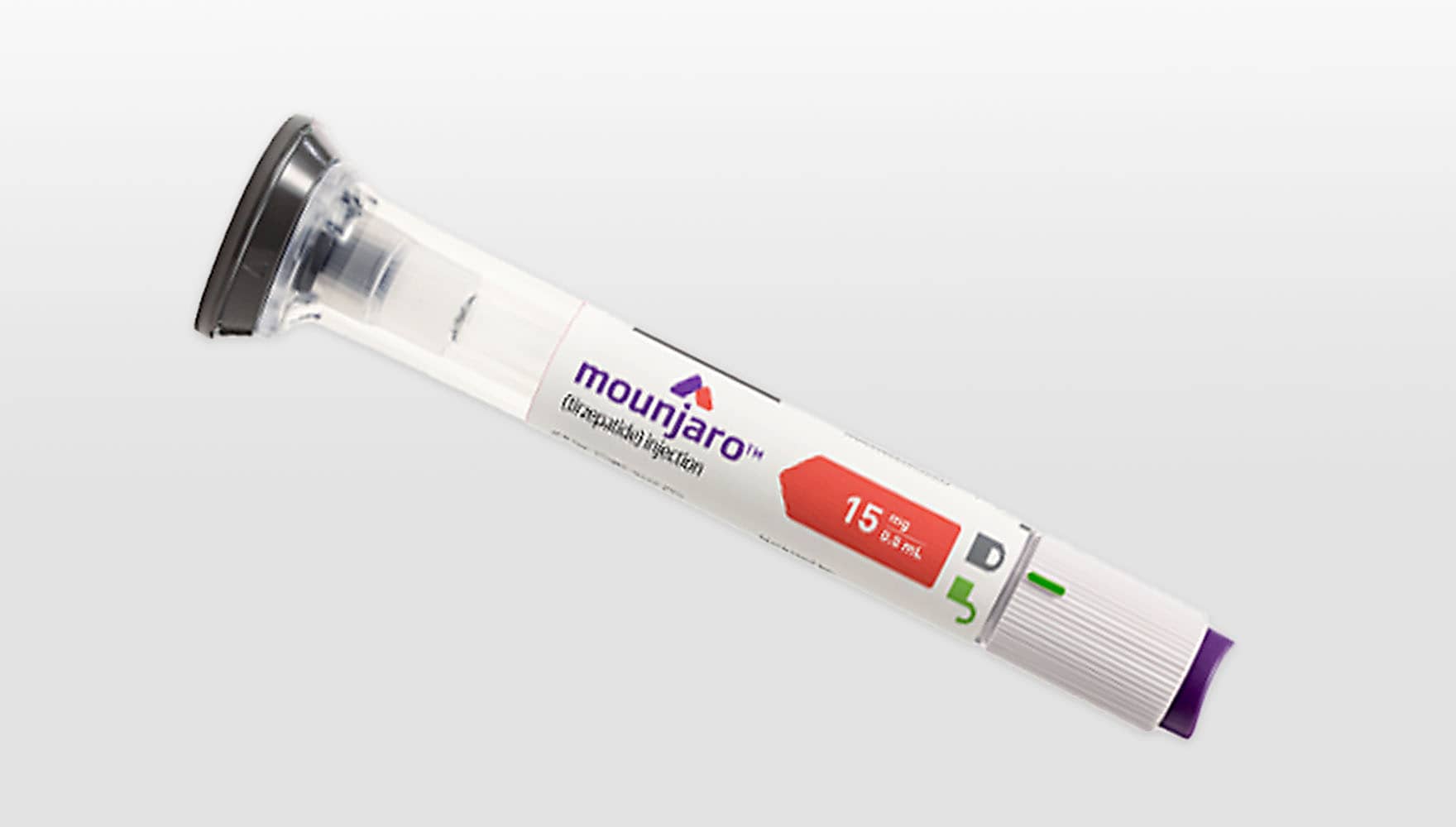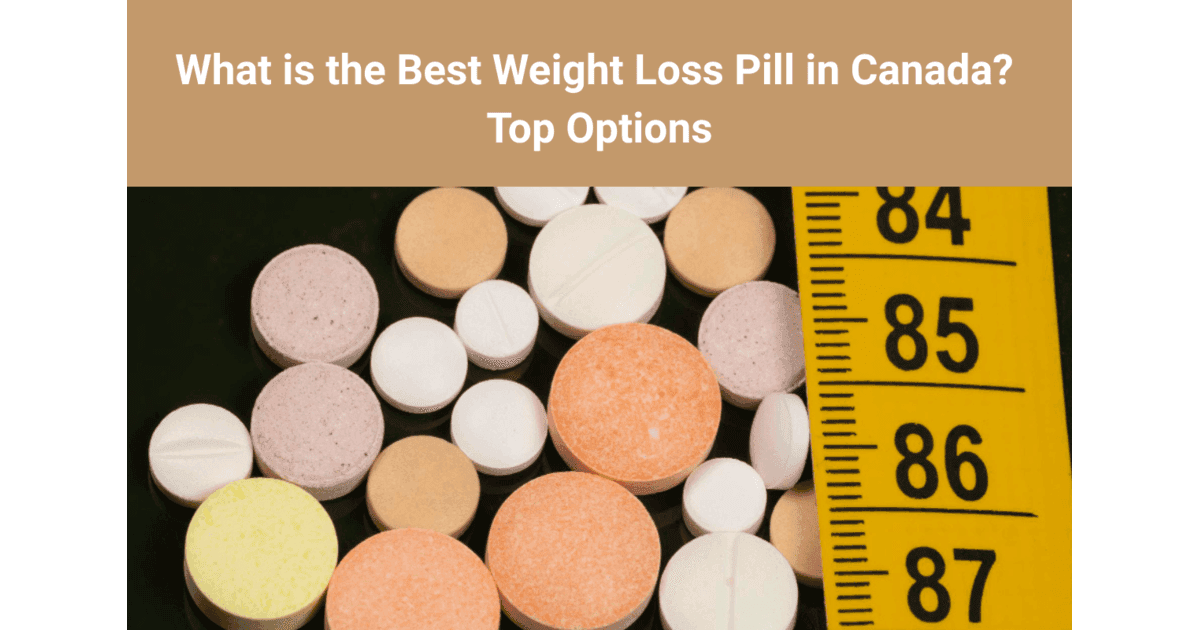Losing weight isn’t just about willpower, especially when conditions like insulin resistance, sleep apnea, or fatty liver disease complicate the journey. As a result, more Canadians are exploring medical options like Ozempic, a medication that has gained widespread attention as a promising solution for individuals striving to lose weight.
According to a recent survey by Dalhousie University, 27.2% of users take Ozempic specifically for weight loss, while 11.6% use it for both diabetes and weight management.
With obesity rates on the rise, the demand for effective, evidence-based weight loss treatments has never been greater. So, let's explore how Ozempic weight loss works, what the science says, and what to expect, without hype or shortcuts.
In this blog, we will also break down common side effects and offer tips for safe use, helping you make an informed decision in partnership with your health care provider.
What is Ozempic?

Ozempic is a prescription medication used to manage Type 2 diabetes and, increasingly, for rapid weight loss. Its active ingredient, semaglutide, belongs to a class of medications called GLP-1 receptor agonists, which are designed to mimic a natural hormone involved in blood sugar and appetite regulation.
Here are a few key things to know about Ozempic:
- Originally developed to help lower blood sugar levels in adults with Type 2 diabetes.
- Helps reduce weight by influencing appetite and digestion, leading to lower food intake and improved blood sugar control.
- Approved by Health Canada for diabetes, but often prescribed off-label by health care professionals for weight loss.
- Taken as a weekly injection, usually in the upper arm, abdomen, or thigh.
Ozempic’s growing popularity reflects its dual role in supporting disease control and helping eligible individuals reach their weight loss goals under medical supervision.
How Does Ozempic Work for Weight Loss?
You must be wondering how does Ozempic cause weight loss? Let’s break it down.
Ozempic’s effectiveness as a weight loss medication is rooted in its ability to regulate hunger and satiety. The drug acts on the brain’s appetite centers, allowing individuals to consume fewer calories and feel full for longer. This leads to a gradual reduction in weight, as users learn to eat less.
Moreover, by helping regulate insulin levels and lower blood sugar, Ozempic supports metabolic health, a critical aspect when trying to lose weight.
However, it’s important to note that Ozempic is not a magic bullet for weight loss. To maximize its effectiveness, it should be used alongside lifestyle changes, including healthier eating habits and increased physical activity.
How Long Does it Take to Lose Weight with Ozempic?
Weight loss with Ozempic tends to happen gradually, with consistent results seen over time rather than immediately. Here's what the research and real-world data show:
- Initial Results are Modest: Most individuals may notice minor changes in the first few weeks, particularly while starting at a low dose. But as the weeks go by, the cumulative effects of reduced appetite and improved metabolic function lead to more substantial body weight reductions.
- Weight Loss Builds Over Time: Based on studies, significant reductions in body weight typically occur between weeks 20 and 68. By this time, most participants reach their peak weight loss, although some continue to lose weight beyond this period.
While results vary, this slow and steady approach supports a more lasting shift in the body’s weight set point. Particularly, when guided by a health care professional and combined with a balanced diet and regular exercise.
Is Ozempic Safe for Weight Loss? What the Studies Say
Numerous studies have been conducted to assess Ozempic's efficacy in promoting weight loss. On average, studies indicate that individuals using Ozempic can expect to lose between 5% and 10% of their initial weight over approximately 68 weeks (roughly 16 months). However, some patients have reported even more significant weight loss, with reductions of up to 15% or more in weight.
These findings are backed by large-scale clinical trials that evaluated both the safety and effectiveness of semaglutide as a weight loss treatment.
One of the most well-known series of studies is the STEP Trials. Let's dig in!
The STEP Trials
One of the most significant series of studies on Ozempic's weight loss effects is the Semaglutide Treatment Effect in People with Obesity (STEP) trial series.
In the STEP 1 trial, overweight or obese participants who received 2.4 mg of semaglutide weekly lost an average of 14.9% of their weight over 68 weeks. This weight loss is particularly impressive when compared to placebo groups (participants who did not receive the medication but followed the same lifestyle), which recorded an average weight reduction of only 2.4%.
The STEP 2 trial, which focused on individuals with type 2 diabetes, found that participants receiving 2.4 mg of semaglutide experienced an average weight loss of 9.6%, compared to just 3.4% in the placebo group. While the weight loss was slightly less than in STEP 1, the results are still considered clinically meaningful, especially given the metabolic challenges associated with diabetes.
Additionally, the STEP 3 trial revealed that participants lost around 16% of their weight when semaglutide was paired with intensive behavioral therapy and lifestyle modifications.
Recognizing these substantial benefits, the FDA approved semaglutide under the brand name Wegovy in 2021, specifically for chronic weight management in individuals with obesity or overweight conditions.
Is Ozempic Available in Canada for Weight Loss?
Yes, Ozempic is available in Canada at DooÜ. However, it’s often prescribed off-label for weight management in individuals with related conditions like heart disease or chronic kidney disease.
That said, Ozempic isn't right for everyone. Let’s find out who can and who shouldn’t use it.
Who Benefits Most From Ozempic?
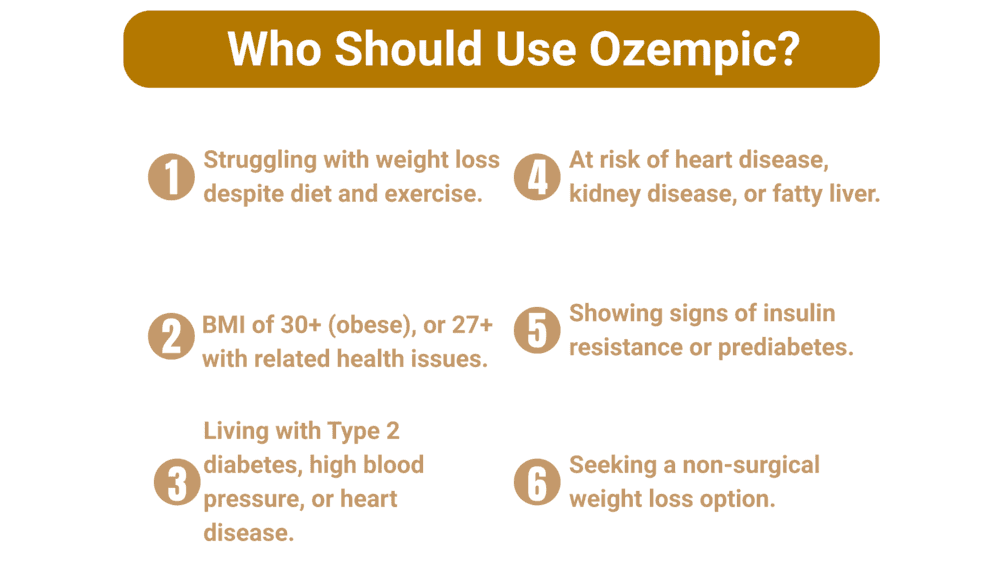
Ozempic is especially beneficial for adults who are medically overweight or obese and are also managing related health risks. It’s often considered for those who have not seen success with diet and exercise alone.
You may benefit from Ozempic if you:
- Struggle with weight loss despite efforts through diet and exercise.
- Have a body mass index (BMI) of 30 or higher (classified as obese).
- Need a non-surgical option for weight loss, such as an alternative to bariatric surgery.
- Are at risk of developing chronic kidney disease, heart disease, or fatty liver disease.
- Have a BMI of 27 or more (considered overweight) with at least one weight-related condition, such as Type 2 diabetes, high blood pressure, or heart problems.
- Show signs of insulin resistance or prediabetes, where Ozempic’s effect on insulin secretion and glucose control may help prevent the progression to diabetes.
Who Should Not Use Ozempic for Weight Loss?
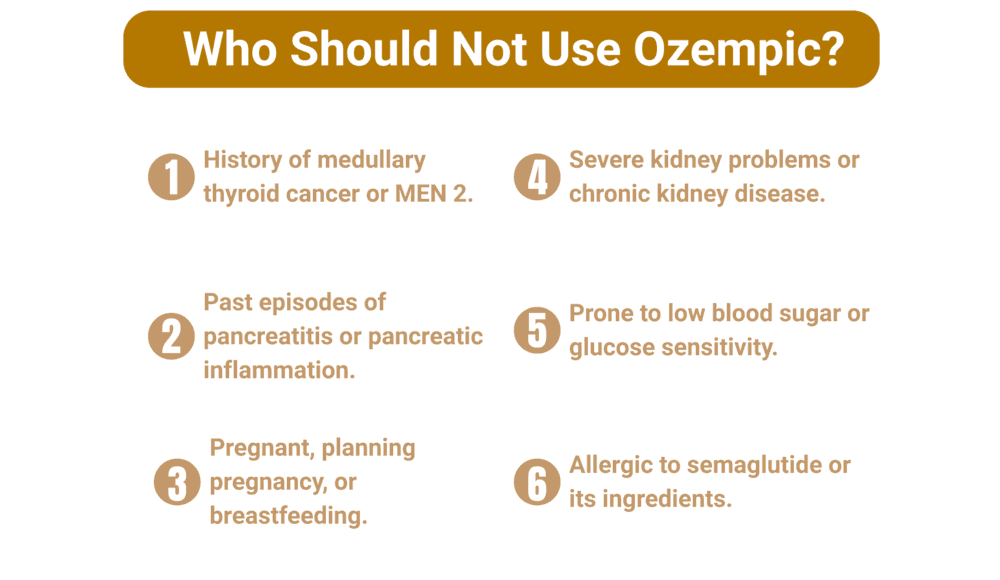
While Ozempic can be effective for many, it is not suitable for everyone. Certain health conditions and risk factors may increase the likelihood of serious side effects, making its use unsafe in some individuals.
You should not use Ozempic if you:
- Have a personal or family history of medullary thyroid cancer or multiple endocrine neoplasia syndrome type 2 (MEN 2).
- Have a history of pancreatitis or inflammation of the pancreas.
- Are pregnant, planning to become pregnant, or breastfeeding.
- Have severe kidney problems or a history of chronic kidney disease.
- Experience frequent low blood sugar or are highly sensitive to changes in glucose levels.
- Are allergic to semaglutide or any ingredients in the formulation.
Thinking About Ozempic? Here’s What to Know About Side Effects
If you're considering Ozempic for weight loss, Canada, it's important to be aware of possible side effects and safety considerations. While many individuals respond well the medication well, some may experience the following:
- Common Side Effects: Nausea, diarrhea, constipation, and a general feeling of fullness.
- Gastrointestinal Side Effects: Often mild and temporary, but can include bloating, vomiting, or discomfort.
- Injection Site Reactions: Redness, swelling, or irritation at the site of drug administration.
- Dizziness and Fatigue: Some users report light-headedness or brain fog, especially during dose adjustments.
- Serious Risks (though rare) like:
- Thyroid tumours, including medullary thyroid carcinoma (MTC)
- Gallbladder problems or inflammation
- Gastroparesis (slowed stomach emptying)
- Increased risk of heart attack in patients with underlying cardiovascular issues
What to Keep in Mind When Using Ozempic?
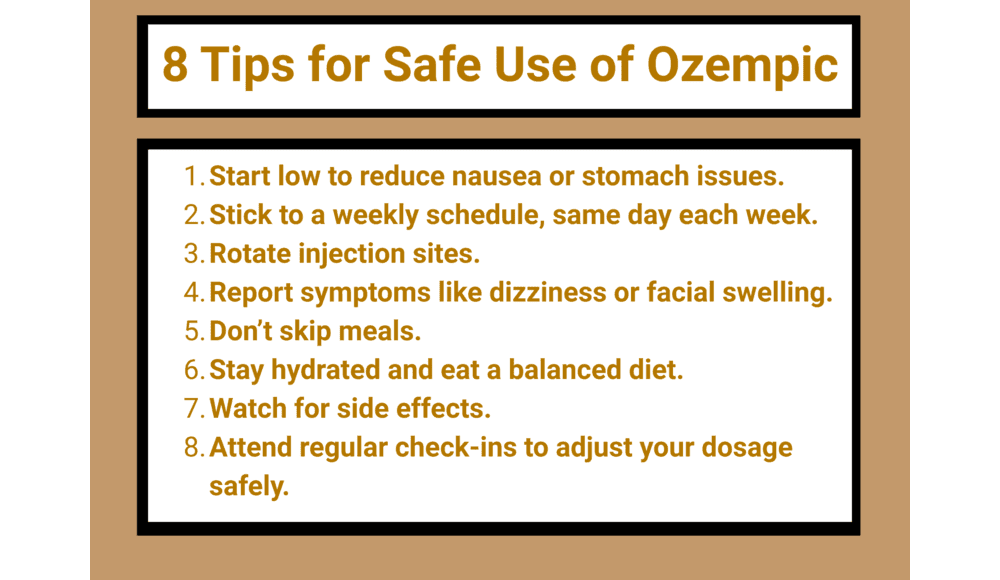
Using Ozempic safely involves more than just taking your weekly injection; it requires mindful habits and regular communication with your healthcare provider. Here are some important tips to follow:
- Start with a low dose to reduce the risk of gastrointestinal side effects like nausea or constipation.
- Take it consistently on the same day each week, with or without food.
- Inject it properly, rotate sites between the abdomen, thigh, or upper arm to avoid injection site reactions.
- Monitor your body’s response, report symptoms such as dizziness, shortness of breath, or swelling of your face to your provider.
- Avoid skipping meals, as Ozempic may lower appetite and lead to low blood sugar in some users.
- Stay hydrated and follow a balanced diet to support digestion and minimize discomfort.
- Watch for serious side effects, especially if you have a history of pancreatitis, gallbladder problems, or thyroid tumours.
- Attend follow-ups regularly to adjust dosage and track progress.
Need support with your medication routine?
Trust DooÜ for Your Ozempic Weight Loss Journey
Struggling to lose weight despite doing everything “right”? You’re not alone, and you don’t have to navigate medical weight loss on your own. At DooÜ, we make accessing Ozempic simple, safe, and stress-free for Canadians who are ready for real, sustainable change.
Our process is 100% online and guided by licensed medical professionals who understand the complexities of weight-related health issues, like insulin resistance, high blood pressure, and metabolic slowdown. With fast assessments, personalized care, and no in-person visits required, you’ll have expert support from first dose to follow-up.
Start your journey with DooÜ today.
Final Thoughts: Can You Really Lose Weight on Ozempic?
Ozempic has shown promising results, with many individuals losing 5% to over 15% of their body weight in clinical studies. Its effectiveness is even greater when combined with healthy eating and regular exercise. While not a quick fix, Ozempic can be a powerful tool for those committed to long-term lifestyle changes.
If you are contemplating Ozempic as a weight loss solution, consult with your healthcare provider to discuss whether this medication is suitable for you. With proper guidance and a commitment to healthier lifestyle choices, Ozempic can help you realize your weight loss goals and improve your overall health and well-being.
Frequently Asked Questions
How much weight can you lose in a month on Ozempic?
Most individuals lose between 1–3 kg (2–6 lbs) in the first month, depending on dose, lifestyle habits, and medical profile. Weight loss is typically gradual, with more noticeable changes occurring after consistent use over several weeks.
Do you regain weight after stopping Ozempic?
Yes, some people regain weight after stopping Ozempic, especially if lifestyle habits aren’t maintained. Without the appetite-suppressing effects of the drug, it can be challenging to sustain reduced calorie intake and long-term weight loss.
What is Ozempic doing to people's skin?
Some users report sagging or loose skin after rapid weight loss on Ozempic. This can happen when weight is lost faster than the skin can adjust, but it’s not a direct effect of the medication itself.
Is it safe long‑term?
Long-term studies are ongoing, but current data suggest Ozempic is generally safe when monitored by a healthcare provider. However, risks like thyroid tumours, pancreatitis, and gastrointestinal side effects mean regular medical follow-up is essential.
How fast will I see results?
Many users notice reduced appetite within the first week. Weight loss tends to begin gradually, with more visible results after 4–8 weeks of consistent use, especially when combined with healthy eating and physical activity.





























